Before Yuuko ended her own life, she explained, “People have many sides to their heart. They’re all truths. You will not decide mine!” Yuuko did not want Inga to peer into her soul — the implication here being that Yuuko wants to affirm her own truth. Throughout UN-GO, characters express this very existentialist notion that the truth can exist in many different forms, but it is up to the individual to decide their own reality. Recall Rie’s words at the end of the first episode: “But I’m sure his wife really believed that Kanou-san was a hero. A hero who fought hard to protect his family and company amidst this chaotic world. Such a beautiful lie must exist….”
This existentialist notion that many truths exist — that we can simply choose our own reality — contradicts the very narrative of UN-GO. Throughout the series, Shinjuro battles through countless facades to find the real truth. He often dispels the myriad fantasies that others have constructed. Plus, we always see Rinroku Kaisho distort the flow of information with his own brand of “truth.” It would seem as though he has the power to decide the truth for others. Finally, unless we assume that her characterization is unreliable, does it ever seem as though Inga influences her victims’ answers? I’m inclined to say no.
In UN-GO, it’s difficult to discern fact from fiction. We know that the Chairman definitely lies, but even a self-proclaimed seeker of truth like Shinjuro will obfuscate the facts from time to time. When he finally decided to reveal his history to Rie, he confessed, “A woman saved my life once. We’d only just met, and there was no benefit to her saving me… She died… And Inga’s body… is hers.” But when did Yuuko ever save Shinjuro’s life? Even if Yuuko was solely responsible for ending Inga’s possession of Shinjuro, she only did so inadvertently; she was primarily motivated by her desire to lock her soul away from Inga’s prying eyes. If I am right, did Shinjuro opt for a beautiful reality over the ugly truth?
In my mind, there seems to be only two honest characters in the show: Inga and Rie. We are told that Rie simply cannot tell a lie, but Inga’s entire purpose is to unearth the truth buried deep within a person’s heart. When she has you in her seemingly unbreakable grip, you are unable to lie. The show’s premise would thus fall apart if Inga was suddenly unreliable. In a world where Rinroku has the near limitless ability to distort the facts, Inga serves as the equalizer for the disadvantaged Shinjuro. But before we get into that, let’s do a brief introductory on just exactly what existentialism entails.
The challenge of existentialism implies that an individual’s values and meaning rise from his or her own autonomous will to embody those values; values have no grounding beyond that will. The norm of authenticity suggests that we can confront those values in two ways: inauthentically, as values “one ought to have,” or authentically, as “the values that I choose.” Although one might be perfectly happy and successful in living an inauthentic life, doing so seems to devalue the nature of the autonomous will, at the sake of integrity and (ultimately) of autonomy itself.
There seems to be tension in these two notions. A superficial way of raising the point might be to ask: “Can one authentically choose the values of the crowd?” For instance, can the Christian authentically endorse Christian values (understood in Nietzsche’s terms as self-devaluing) without sacrificing integrity and autonomy?
However, the above questions are something of a special case of a more general problem with the two notions. That is: how is one ever able to authentically choose values if they are based on nothing other than the abstract will? What basis does the individual have to make such a choice? I may make choices that seem transparent and authentic from my perspective, but what guarantee do I have that these choices aren’t just a result of my existing delusions and biases?
Authenticity is cast as a kind of introspective transparency of one’s motivations, but people hardly (if ever) have such immediate access to their motivations. But if that’s the case, then people have no basis for judging an action as “mine” as opposed to “theirs,” and thus no grounding for determining a choice as authentic. And, since existentialism denies grounding values in anything other than autonomous choice with authentic choice as the ideal, it seems I lack any basis for evaluating my values. This seems to leave the existentialist in a very strange place.
To recap, UN-GO is based on a series of short stories set during the Meiji period of Japan. As a result, I was initially cynical of Bones’ decision to shift the setting to the present day for the adaptation. I was afraid that the studio might have been fueled by a need to “sex” up the story, so to speak. In hindsight, my apprehensions were unfounded. By planting the characters right dab in the middle of the Information Age, the story critiques the limits of existentialism in the 21st century.
As I’ve previously argued, people hardly (if ever) have such immediate access to their motivations. This is truer than ever in our day and age. We are constantly being bombarded with information. For instance, the advent of social media platforms like Twitter provides us with near instantaneous access to any corner of the world. Before we can even make a proper assessment of any situation, another ten to fifteen items may have just popped up on the news feed. Information thus plays a powerful role in how we perceive the world. More importantly, information is rarely ever neutral. Sometimes, the supposedly reliable information we get is just plain wrong (see: CNN’s reporting or lack thereof).
We must remember that nearly every single word we utter is colored by our perceptions. Also, these words have the power to shape our lives. In the film, Shinjuro initially believed that he could help people across the world by traveling around with some old movie reels, but what even motivated him to embark on such an undertaking? Is this an authentic value born from his abstract will? How could he ever know: “They all said that so long as I grow up and help others, it would be payment enough.” His entire life may have already been determined from the very start.
If words can have such an immense effect on people’s lives, it is no wonder then that Kaisho Rinroku basically operates as an information broker. The most egregious example of this is Koyama’s testimony of Rinroku’s powerful data-editing software. Allegedly, the program allows the government to tamper with evidence. Information is power, and in the world of UN-GO, Rinroku controls the flow of information. He decides who’s guilty and who’s not guilty. He manipulates wartime spirits when they begin to flag. Political dissenters find themselves locked away in a high security prison. It is even implied that he may have orchestrated a war to serve his own ends (I suspect that Serada was being manipulated from start to finish). With his power to influence reality, the Chairman is nearly a God in Japan, but why? What does he hope to achieve?
If all humans were saints and sages, all truths would be laid bare, and every great cause, justification, means, ideal, and lie… would likely become unnecessary. But I wonder if that day will ever come. All we can do is improve ourselves, little by little.
Is that a hint of humanism at the end there? Knowing Rinroku’s propensity to manipulate information, it is difficult to take any of his words at face value. Let’s step back for a moment and take a closer look at the UN-GO universe. The Chairman opposes the nationalization of solar power generation. Instead, he dreams of a world where political boundaries cease to exist. Even so, almost nothing happens in Japan without his expressed approval. What accounts for this seeming contradiction? It’s simple: corporations are not subject to political boundaries. If he can break into the solar thermal market, and spread the technology overseas — under his corporation’s supervision, most likely –, Rinroku’s influence will become global.
People tend to believe that the truth is something hidden. There are subsequently those who believe they themselves will someday learn it. But there are an innumerable amount of truths. If someone becomes satisfied with a single truth, it simply means that they’ve stopped thinking any further.
When the Chairman uttered these words, he likely knew that Shinjuro would be listening. Rinroku might not necessarily see himself as an existentialist, but he knows he can profit from it. The logical endpoint of authenticity in a media-driven world is the obfuscation of the inner soul. Billions of dollars are being spent on ad campaigns every year to influence our buying habits, and that is just one example of the information miasma that we call the 21st century. We are not 1920s French existentialists with the luxury to daydream our lives away in dim, smokey cafes. Even then, it’s hard to argue that those thinkers had such a clear window to their souls. Throughout our lives, we try to make decisions based on the evidence before us, but what if the evidence is hardly reliable? What can authenticity do for us then?
Is Shinjuro mistaken then, when he said at the end of the series that “[he] will expose souls?” If we can’t even gaze into our own souls, how will Shinjuro manage this seemingly Herculean task? Easily. I believe that even without Inga by his side, his aims are far from impossible. Note what else Shinjuro had to say: “[People] lay bare the true essence within themselves, their souls. They want for beauty; they seek luxury and pleasure. But at the same time, they love what’s right just as much. With all the evils that exist, there are just as many justices.” In these lines, Shinjuro juxtaposes the subjective with the objective, i.e. beauty, luxury and pleasure vs. the right. In doubting everything, we approach the limits of existentialism. We thus return to square one: regardless of whichever reality we wish to affirm, there is always justice.
Those like Rinroku can hide the truth, but can never truly hope to change it. Thus, he is no God.

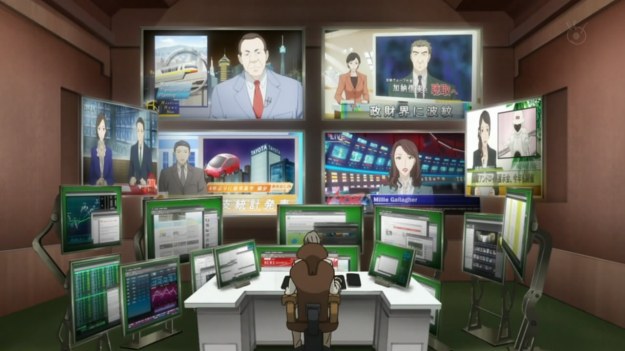
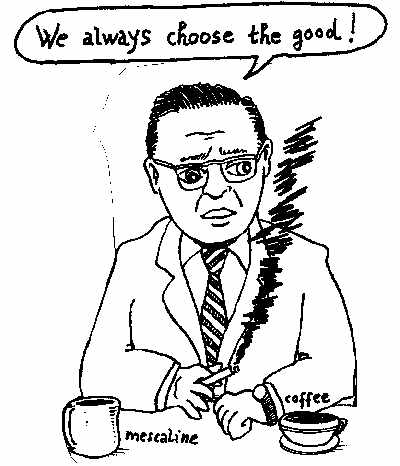
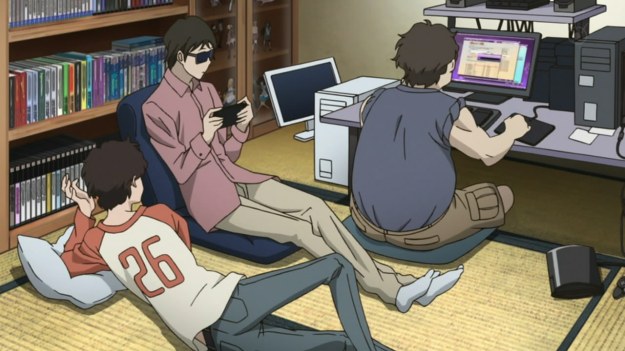
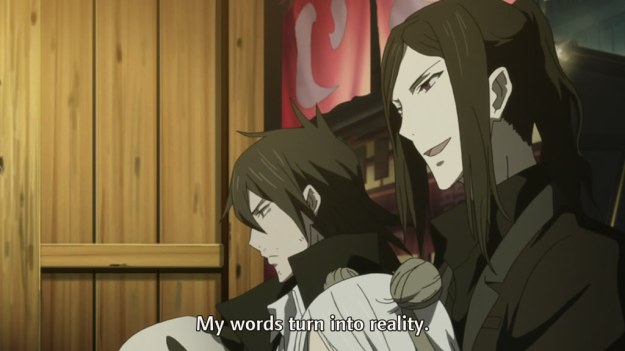
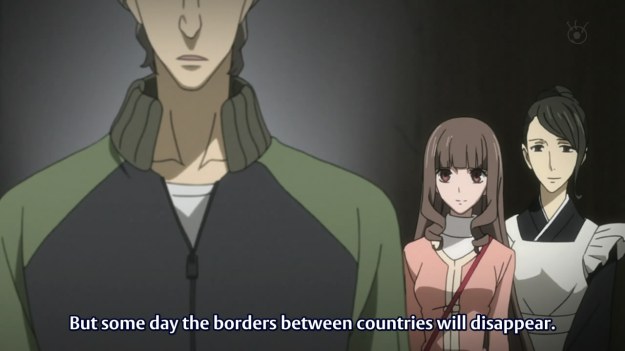
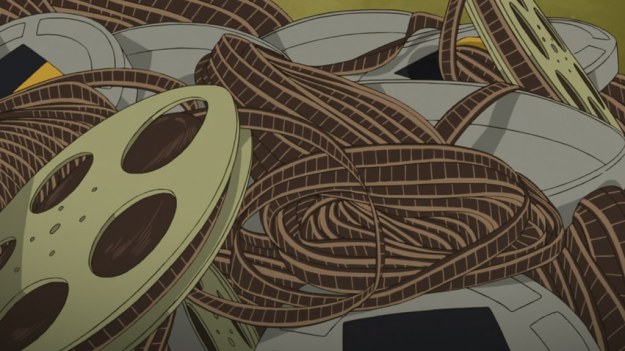
I’mma give myself a little time to process all this before I type up a proper response. I should probably go and actually watch UN-GO too <_<.
In the mean time, have you read much Nietzsche? I'd be interested to hear your thoughts on him and his philosophy (disregarding his awful opinions on Women, which I'm sure we'd both agree are just silly).
Eh, he doesn’t really write like a philosopher. He’s very loose with his ontology.
I was afraid you’d never blog the rest of Un-Go. To really address the points you did raise would require my refamiliarizing myself with parts of the series which isn’t something I can do immediately but would like to do now soon that you’ve posted.
One thing that does come to mind, if I remember right, is isn’t it the case that the specific way in which the Ingaron villain met his fate required there to be enough of an objective truth out there that he could wind up so nicely hoisted by his own petard? The way I remember it now the Ingaron met his end by basically narrating that the police officer would show up and “shoot the bad guy”, only to get shot. If I’m remembering it right it’s a coy way of taking a stand on the some of the issues surrounding the various kinds of truths, but it’s been long enough that I could be horribly misremembering that portion.
It’s cool. I didn’t expect this post to get any response even though people say all the time that I should blog older shows. Besides, I didn’t really cover everything about the show the way I might’ve had I been blogging along the way. I covered the first idea that immediately jumped at me.
And yes, I believe you’re right. Serada said something along those lines.
Oh, I guess I should add that I also wrote this post because I looked around and people seemed to have bought the whole “there are multiple truths” angle to the show.
I want to respond to your article, but I’m not sure what your argument is. Are you saying that despite the existentialist quotes, there is only one truth in the anime? Sorry if I misinterpreted it.
My argument is literally “the limits of existentialism in the 21st century.” We think that the best way to live is to choose our own way in life — affirm our own values. We don’t want to be influenced by the biases surrounding our everyday lives. The anime demonstrates that it is very difficult or perhaps impossible to discern your actual (in philosophical terms, authentic) desires from desires that have been influenced by bias, especially in a heavily media-driven world. I don’t think the anime calls for an outright rejection of existentialism. It’s just that existentialism might be more difficult than we had previously imagined. But in the end, not all hope is lost. There’s still one thing we can rely on that cuts through subjective biases: justice. The moral right is a priori and (presumably) isn’t subjective.
Oof, really? Justice objective and a priori? I never was a fan of Kant, but that in particular just seems self-evidently incorrect. What the hell is objective justice?
Should probably note that this isn’t aimed at you specifically, since you’re just stating UN-GO’s perspective and I have no idea whether you agree or not.
Why don’t you give me an example of why it is self-evidently incorrect?
If it matters, I’m not a moral or ethical relativist.
Also, it’s important to note that society often conflates the right, i.e. what we might derive from pure reason, with the morals held by any given culture. Take a moral truth that many people take to be objective: “Cruelty for its own sake is wrong.” Wouldn’t everyone of presumably sound mind and judgment take this statement to be a universal law? If you are a moral relativist, you would have to deny this claim. Nevertheless, our interpretation and application of said universal law is hardly consistent across all cultures. We enact laws based on our subjective interpretations of universal truths such as the example given above. In that case, morals can seem relativistic, but again, this is the mistake of conflating the right with the morals we personally hold.
Gee, I dunno, the implication I got from that is that justice is the exception to the subjectivity rule. Seems to me the ball’s in your/UN-GO’s court to justify why only it is exempt.
I’m not quite sure what point you’re trying to make with that second comment. So we shouldn’t conflate the way humans enact morality with universal truths, as established by pure reason? Maybe I’m just misinterpreting in my addled tiredness. I am a moral relativist and I wouldn’t say anything is a law without context. I see no reason to believe the universe has absolute right or wrong. If the a priori exists (and I don’t think it does), I don’t see what relevance it has to us, because what means do we have to possibly access it? Pure reason? I’m not convinced.
What subjectivity rule?
Take “Cruelty for its own sake is wrong.” Is it untrue? What context does it need?
Do you think logic is a posteriori? Do you need experience to discern that A + B = B + A?
Our reasoning?
Sorry, I’m mixing up a priori with noumena here. I really am too tired for this right now. I still disagree whole-heartedly, but I’ll get back to you once I’ve had some sleep.
Well, whenever you get around to responding to my previous comment, let’s just forget about Kant for a second. I never mentioned him and he’s hardly the only person to think that the right can be derived a priori. More importantly, I don’t want to get caught up on who said what.
Re: subjective rule thing. You said “There’s still one thing we can rely on that cuts through subjective biases”. That sounded to me like you were saying that justice was one of the few things not affected by subjective biases. Also what you said at the end of the post about juxtaposing the subjective with the objective, listing off beauty, luxury and pleasure as subjective, but only justice as objective. So my question was, why only that?
In regards to Kant. I’m sorry, I wasn’t trying to name drop or muddle things, it’s just that I’ve actually studied a bit of Kant and some of his apologists, and it’s mainly where my understanding of terms like a priori, a posteriori, noumena vs phenomena etc. come from, so you can understand why these terms are pretty linked with Kant for me.
I’d like to clarify a few things before arguing any further. Firstly, you say not to conflate cultural morality with the right. That’s all very well and good, but if that distinction needs to be made, doesn’t that suggest that peoples’ sense of morality is altered by their life experience. What makes the a priori morality more valid? Even if it can be derived a priori, does that mean everyone would accept it? Does it make it any more real to people than their subjectified sense of morality? Does it make it any more functional?
I’m uncomfortable with your use of the term “universal truth” here. Are we talking about absolute, universe coded morality (sorry to use Kant again here, but I think the term is apt), as in the noumena, or simply an innate, human morality we are all born with but which is corrupted by bias as we grow?
It seems to me you can’t derive anything, pure reason or not, without axioms to start with, so what are our axioms for morality? I just don’t see what we have in this situation that could reasonably be called properly basic.
Well, no, that’s not exactly what I was trying to get across. People’s sense of morality is often subjective, but that doesn’t eliminate the possibility that moral truths nevertheless exist. By saying that justice can cut through the subjective biases, I’m saying that justice can be distinguished from subjectivity, not that morals are always objective.
I’ve argued throughout the post that UN-GO believes that objective truths can exist in people’s heart. The main character then prattles off a list of subjective terms, then at the end, mentions justice. So I’m only restating his conclusion.
To reiterate, I’m trying to draw the distinction between moral truths and what people consider to be their morals. “Cruelty for its own sake” appears to be one such moral truth. The way we extrapolate further morals from said truth, however, is subjective. Different cultures can interpret the same truth in different ways, giving rise to different sets of moral values. Just because our laws are different does not necessarily rule out the possibility that certain universal moral truths exist.
Well, look, I said I wasn’t a moral relativist, but I never said I believed that all morality is a priori. But to play devil’s advocate, making morality a priori eliminates the arbitrariness of conflating justice with pleasure. Deriving morality from experience from entails maximizing the best possible ends for mankind. Kant wants justice to be right in all cases, and there’s an argument to be made that some actions are just regardless of their net benefit to mankind.
Of course not. Not everyone comes to the same conclusions, but that does not mean one truth might nevertheless exist. We can disagree on whether God exists, but this is still a yes or no question. Just because we disagree doesn’t mean there is no objective answer to the question. We simply don’t know the answer.
One would argue that the functionality of justice is irrelevant. The right is right, regardless of whether or not it’s functional.
Whoa, whoa, that is not how I understand the concept of noumena vis a vis Kant. The noumena relates to his metaphysical view of the world, i.e. the thing-in-itself that we can never truly perceive. The reason he’s a moral rationalist — in other words, someone who believes morality is derived a priori — is because he believes we can never observe the moral rightness of an action in the noumena. Since we can’t observe it in the wilds, so to speak, it makes it extra difficult to derive morality from experience. Nevertheless, he reasons, certain moral truths exist. How do we come by them if we can’t derive morality from experience? By process of elimination, he’s a moral rationalist.
Well, dude, that’s what philosophers have been debating for centuries. I’m not claiming that any one person has all the right answers, but just because it is difficult to construct a set of rigorous moral axioms, and thus derive the rest of your moral framework, doesn’t mean it’s impossible either.
It’s been a while since I’ve seen the series but this post just reminded me how much I enjoyed Un-Go. Thanks E Minor, your post is fascinating because I initially thought that Un-Go was all about the presence of different truths. Reading this had me reflecting, that regardless of what truth we choose or how much we refuse ourselves to defined by one, we have to face the inevitable repercussions of our actions.
Your observation on Rie and Inga being the only truthful characters in the series is spot on. More interesting is that Inga’s name literally translates to cause and effect.
Shinjurou almost had me believing that Yuuko made some grand sacrifice for his sake, but the OVA clearly didn’t portray it that way. Granted, the two /probably/ had romantic feelings between one another (the manga goes as far as to show them having sex the night before the terrorist attack). Ultimately, it was Yuuko’s choice to end her life before Inga could reveal her soul. The entire sequence was slightly reminiscent of a line in one of Ango’s essays, how he was glad a young woman he knew ended her life before she could be corrupted by the world.
With Yuuko ending her life without Shinjurou having scene what her ‘truth’ was, she effectively leaves something of an idealized image of her in his mind.
I just kept thinking as I watched the show, “What is the point of Inga if there are multiple truths? Does Inga just randomly select one for you?”
The OVA was also subtitled “Causality.” I initially wondered if the show wasn’t a ringing endorsement instead for determinism, the philosophical doctrine of basically “cause-and-effect” taken to its logical endpoint. In the end, I had trouble reconciling that idea with the characters’ actions. Not that the anime doesn’t, but I’m not the person who can effectively argue it.
Hm, if this is the case, I find this a touch chauvinistic on Shinjuro’s part. It just feels like ex post facto reasoning: “Y-yeah, it’s good that you died! I wouldn’t want to find out that you were a horrible person anyway!”
To clarify on this: Inga as “cause-and-effect” is 因果, and gets glossed in the standard J-E dictionaries as “cause and effect; karma; fate”. You’d have to consult an expert to actually get more elucidation beyond that. All I’m comfortable saying is that the sense I get is that in larger compounds it’s pretty much a direct equivalent to “cause-and-effect” / “causal” / “causality” (depending on the compound) but that on its own it has something of a karmic nuance. But, again, consult an expert, don’t take my word on it.
In re: Yuuko, I remember coming away from her scenes with the impression that her objection to Inga was grounded more in personal agency — given a set of valid truths, who gets to pick which are made public and which left private — than in the “there are multiple, equally valid, possibly-contradictory truths” philosophy you get from the chairman. This could just be me misremembering things post-facto, but it’s what I remember walking away with after seeing episode 0.
If accurate, though, it would add a nice symmetry to Shinjuro’s story: there’s a value to being prudent as to which truths you reveal and when you reveal them; it’s not a good idea to go around revealing truths willy-nilly. Or, at least, that’s what he thinks at first, but then we get the nice “sunny day” epilogue wherein Shinjuro begins to disclose everything to Rie, perhaps symbolically moving past both Yuuko and the lesson he learned from Yuuko’s death?
That might be a bridge too far in terms of interpretation, but I bring it up just because I did remember Yuuko’s objection to Inga having a pretty different spin to the chairman’s own take on these issues, and hopefully remembered right. If nothing else it’d give Shinjuro an easily-identifiable personal growth arc over the course of the series.
Well, I quote Yuuko’s words exactly as she says them, so if there are any errors, I can only attribute it to the translation. Even so, she says, “You will not decide mine” — ‘mine’ referring to her truth. To me, that feels as though her intent goes further than simply fighting for her right to keep private certain truths. Rather, her words seems to imply that she doesn’t want to confront the real truth in her heart. After all, I felt the tone of the anime toward the NGOs was rather… dismissive. What tangible benefits were they actually confering to the citizens of third world countries through their singing?
As for Shinjuro’s confession to Rie, I suppose I take a more cynical approach to his growth arc. I actually don’t think he’s being completely honest to Rie. So, in my mind, Shinjuro now believes he can tell certain white lies as long as he’s not violating justice. Otherwise, his ‘no holds barred’ approach to truth-telling will never find him love again. He won’t stand for the Chairman walking away as though he’s one of the heroes, but on the other hand, there’s no sense justice being violated in saying that Yuuko once saved his life. But of course, this reading hinges on the idea that Yuuko never did save Shinjuro’s life. Maybe she did and I simply missed it, but I don’t see it.
Going and reviewing that scene I think there’s a translation issue here. I didn’t hear anything explicitly like a “mine” in that entire run of dialogue, and I think literally the final stretch would be closer to ~”People(‘s hearts) have many sides to them…aren’t all of those (sides) truths?…I won’t let you decide which is true.” Should probably get another opinion on it before building a huge interpretational theory, however. And in any case you’re very much right as I recall, both the NGO and the music group (which I guess is also an NGO) were very much presented as more than a little ineffective and pointless.
In terms of her saving him or not, I half-suspect the writers are taking a position on intentionality versus interpretation. EG: the way Serada meets his end only makes sense if Bettenou’s doing what he literally said to do, because if Bettenou had done what he intended for her to do he’d still be alive and kicking. So that alone gives us grounds to support a separation between action and intention with said action. So then, with Yuuko’s “saving his life”, her actions can be said to have saved his life despite that not being what was motivating her to perform those actions.
That said, there’s a bit of a problem with that read on her situation: if you do start applying that standard across the board it seems like it becomes harder to pain Rinroku as a pure villain, because it pushes things in a direction wherein some of what he has done is good (even if his intentions were unambiguously horrible)…and thus, to be consistent, you’d have to start evaluating him on the basis of whether or not his actions net out to be positive or negative, but I think I agree with you in that not only is that *not* how the show wants you to look at Rinroku, that very style of thinking is itself something the show wants you to look at a bit askance by the end…so that outlook looks at least a bit problematic to adopt.
In re: being honest to Rie, I remember it feeling pretty straightforward, in the prior episode he’d brushed off explaining about Inga to her and Rie had said something about everyone having things they’d rather not talk about, and then post-finale he starts telling her the full story (with the audio fading out so we don’t know what he did or didn’t say after explaining who and what Inga’s is). Given the way it’s framed interpreting his level of honest is about like you summarize it as: it a lll hinges on how accurately (or not) you think he is about characterizing what Yuuko did. For better or worse I can see multiple valid takes on that issue…
Even so, this raises issues regarding the exact nature of Inga’s power. Do we think, then, that she just randomly picks a truth deep within a person’s heart to reveal? Or does she pick a truth that furthers her agenda? From my perspective, however, the text supports neither conclusion. There’s nothing to suggest that Inga is at all random in her inquiries, nor does she really care about the situation unfolding around her. She simply wants to consume souls through the revelation of truth. As a result, I stand by the more elegant theory that Yuuko was simply afraid to peek into her closet full of skeletons.
I think intent is too critical to moral reasoning. The difference between Bettenou and Yuuko is that no one is attributing the former’s actions as moral. No one will say that Bettenou acted morally, only merely that the act had good consequences. The same is true of Yuuko’s actions. She did not act morally, the side effect simply being that Shinjuro survived (which, also, raises doubts in my mind — were we really certain Shinjuro’s life was forfeit unless something was done?). If a fly bugs me, preventing me from crossing a street just as a reckless car would’ve run me over, saying “That fly saved my life” is merely a glib statement; it can’t be taken seriously.
As for Rinroku, I would concede that he’s not truly a villain. But again, I think the struggle here boils down to a debate between deontological reasoning vs. consequentialist reasoning. Rinroku will do whatever (in his mind) confers the best possible ends for humankind. His little speech at the end of the series seems to back this up. Shinjuro’s primary stance seems to be that the best possible ends for humankind, i.e. beauty, cannot be subverted by the just.
Well, IIRC the questions Inga asks are certainly not random because once we leave episode 0 it’s always (or almost always?) Shinuro or some other human who tells Inga what to ask to whom. We see Inga getting hungry when in the presence of tasty truths, but again IIRC Inga always leaves Shinjuro in charge. IIRC this seems to be an implicit part of their agreement (I don’t remember it being an explicit condition). In episode 0 when Inga’s acting alone it seemingly tends to go for the metaphorical jugular, whereas Shinjuro tends to ask for less-damaging truths (what did you do last night? what was your husband to you?, etc.).
The other points are well stated and well-argued and since I don’t really disagree with your assessments I’ll just acknowledge them and move on.
I’m not saying that the questions themselves are random. What I’m asking is that if Inga really does decide the truth for others, rather than simply honing in on the one truth, does she pick a truth out randomly if there are multiple truths within a person’s heart? I just don’t see it. I also don’t see anything to suggest she even has an algorithm to decide which truth to reveal. Again, I’m inclined to think Yuuko is just wrong; there’s no reason to think that what she says about the nature of humankind’s heart is true.
Sorry I’m so late to the discussion, but I just recently completed UN-GO and was delighted to find this insightful post and follow-up comments.
I don’t really have a lot to add, except for this one observation on the Shinjuro-Yuuko dynamic: isn’t it fair to say that Yuuko didn’t just literally save Shinjuro’s life, but that she also saved it metaphorically?
Shinjuro was already shown at that point to be a very cynical fellow, yet, in the hours before her death (and Shinjuro’s near-death) Yuuko made a concerted effort to talk to him, both about what she was doing, and about himself. As is alluded to here, there are some fairly obvious signs that he had warmed up to her, if not actually started to fall for her. And, of course, she definitely seemed a bit infatuated with him.
So, at the end of Episode 11, when Shinjuro is talking about what he loves in humans, is it not fair to call back to his brief time with Yuuko? Whether or not she actually gave up her life for Shinjuro, isn’t it possible to suggest that the time they spent together affected him profoundly? So that when he tells Rie that a woman he’d just met sacrificed her life for him, though there was nothing in it for her, it’s not impossible to conclude that believes this to be the absolute truth…
Pingback: Anime Recommendation: Un-Go | The Stefan Keys Blog
Reblogged this on The Un-Go Project.
Pingback: UN-GO: The limits of existentialism in the 21st century | The Stefan Keys Blog